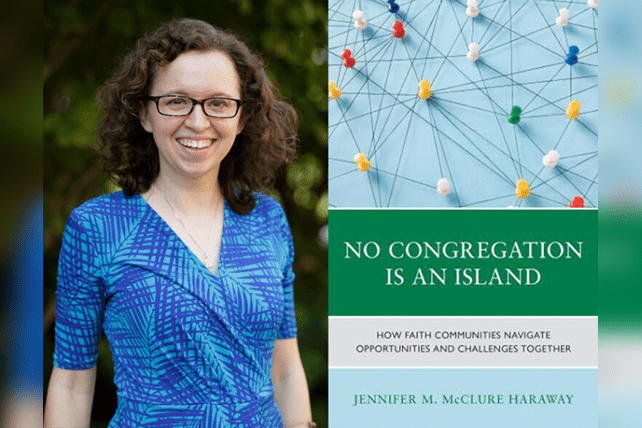(RNS) — America’s congregations are in trouble these days.
They’ve faced polarization, a worldwide pandemic, shrinking memberships, a changing culture and uncertain futures.
Like most of us, they could use a few friends to face their troubles with and figure out together how best to respond, says Samford University sociologist Jennifer McClure Haraway.
“Congregations are experiencing a lot of change in opportunities and challenges,” Haraway said. “We navigate those more effectively when we work together. When we feel like we’re alone, we tend not to navigate them as well.”
In her new book “No Congregation Is an Island,” Haraway hopes to remind churches and other houses of worship of the benefits of working together. The book is based on a survey of more than 400 congregations in and around Birmingham, Alabama, about how they partner with other congregations.
After finishing her initial studies in 2017 and 2018, Haraway wrote a series of academic papers about her findings. But, she said, no one aside from her fellow scholars read the studies.
“Those articles are very technical — and I can’t hand them to any local minister, even though they have practical applications,” she said.
That led to turning her findings into a short and helpful book that would be accessible to congregational leaders. Based on her initial findings along with follow-up interviews and stories, the book looks at how congregations work together with folks from their own tradition as well as those from other groups — and gives tips on how to better collaborate.
One of her tips: Go to denominational meetings, which still matter even during a time when those denominations are in decline. But go for the friendship, not necessarily the programs or debates.
“One of the most important things these events can and should nurture are the relationships between ministers and leaders,” she writes.
While working in their own tradition is simpler — having shared theology and common practices makes trust easier — ministers shouldn’t limit themselves to only cooperating with folks from the same denomination, Haraway says. Otherwise, they might miss out on the insights that come from people who have a different point of view.
Working across traditions can be complicated, Haraway writes, especially if groups have different views on core doctrines. Still, as the leader of one non-denominational church put it, there’s a benefit in breaking free of groupthink.

